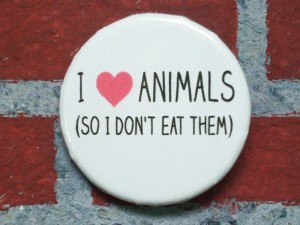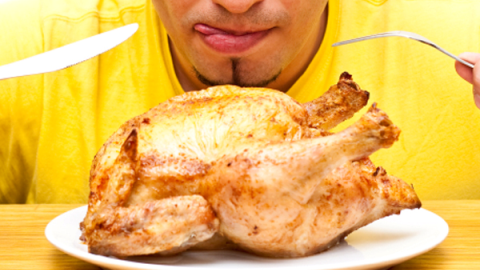A Red Robin fast food restaurant ad is ruffling a lot of vegetarians’ feathers. In it, a cutie pie intones with an ugly smirk and sly aside: “We even have a Gardenburger—just in case your teenage daughter is going through a phase.” Well, here’s some red meat for the carnivores that ran the ad.
 “The idea that not eating animals is reserved solely for teenage girls going through a phase is obviously meant to insult both vegans and girls,” retorted Jasmin Singer, director of a New York-based multimedia vegan activism organization. “Why is Red Robin insulting the very customers it’s reaching out to?”
“The idea that not eating animals is reserved solely for teenage girls going through a phase is obviously meant to insult both vegans and girls,” retorted Jasmin Singer, director of a New York-based multimedia vegan activism organization. “Why is Red Robin insulting the very customers it’s reaching out to?”
I’ll tell you why. With nearly 15% of the US population now identifying themselves as vegetarian or vegan, meat-eaters, meat-producers and meat-sellers have adopted the old adage: The best defense is a good offense. Only in this case, it not only backfired, the ad is sparking a lot of heated conversations around the BBQ pit.
Here’s a comeback I use when some flesh-eater at a family BBQ ridicules me for me for being a vegetarian. I ask them: Would you eat human flesh if you had to do so to survive?
That usually ends the conversation. They’re fine with spoiling my appetite with the smells and jibes of roasting flesh, but don’t want to be confronted about what they’re eating at all.
Flesh-eaters recoil at eating human flesh to survive, like the survivors of the Uruguayan soccer team that crashed in the Andes in 1972 did. But to a vegetarian, flesh is pretty much flesh, and it wouldn’t be that much more repugnant to eat the flesh of a human or a dog to survive in desperate circumstances than it would be to eat the carcass of a cattle off the supermarket shelf.
Indeed, the Andean survivors didn’t view eating their deceased friends and family members as cannibalism at all, but as communion. Killing other creatures unnecessarily for one’s own gustatory pleasure is what’s repugnant, and not just to teenage girls.
Here’s how I became a vegetarian.
Twenty years ago I was living in Silicon Valley across the street from Apple Computer’s corporate headquarters. The Santa Clara Valley was once a small jewel of apricot and cherry orchards running up to the  Santa Cruz Mountains, above South San Francisco Bay. Now, needless to say, it is a sprawling, megalopolis of high technology firms.
Santa Cruz Mountains, above South San Francisco Bay. Now, needless to say, it is a sprawling, megalopolis of high technology firms.
There’s a small park across from Apple, adjacent to the large apartment complex where I lived. Though ducks, geese, and big orange carp filled its man-made waterways, the noise and congestion at the heart of Silicon Valley hardly made it conducive to meditation. So a few times a week I would ride the bike or take the car up into the hills, to walk and sit in Steven’s Creek Park.
It was during this period in my life that meditation became much more consistent, and deepened beyond anything I could have imagined. The sittings in the hills began generating intensely meditative states.
Once, walking out in complete inner stillness, I stopped to take in the surroundings. Suddenly a large number of small animals—birds and squirrels– appeared all around me. They gathered within a foot or two; clearly they had no fear, and were drawn to one.
Walking back to the car, I asked whether I should be vegetarian. The next day, forgetting the experience, and the question, I went to lunch with a female companion. We both had our favorite—BBQ chicken tacos. That night I became very ill, but since she didn’t, I assumed it was the flu.
Three or four days of vomiting and diarrhea later, I began passing blood. Obviously, it was time to see a doctor. The physician’s assistant who saw me (in between a run, pardon the pun, to the bathroom) asked twice, “Have you been out of the country?”
 No, I answered irritably the second time, why? “Because I think you have a bacteria found in chicken that’s rarely seen in this country. And you’re so dehydrated you should be on an IV in the hospital. Since you don’t have insurance, I’ll give you a strong antibiotic, but if you’re not holding down liquids by morning, you have to promise to check yourself in.”
No, I answered irritably the second time, why? “Because I think you have a bacteria found in chicken that’s rarely seen in this country. And you’re so dehydrated you should be on an IV in the hospital. Since you don’t have insurance, I’ll give you a strong antibiotic, but if you’re not holding down liquids by morning, you have to promise to check yourself in.”
The physician came in to confirm the diagnosis, and gave me ‘the look.’ That night I saw Death standing and waiting for me, not in space but in time, two days away. Real or hallucination, I was dead certain that on my present course I would expire in two days.
But the antibiotics worked, and when I went back for a follow-up a week later, I told the doctor about the experience. He verified it, and said that’s why he gave me ‘the look.’
More than a week after onset of the food poisoning, I went out for the first time alone, to walk amongst the living in the little park next door. It was lunchtime and there were lots of people around, as well as the usual feathered fowl residents.
On the way there I asked: Did my getting sick have anything to do with that meditation, the experience with the animals, and the question about becoming a vegetarian? As I entered the park a small, elderly Chinese woman made a beeline for me through the crowd from 50 meters away. Without so much as a nod when she reached me, she blurted out: “Are you a vegetarian?”
When I recovered from my incredulity, I said, ‘No, but I’m just recovering from being really sick after eating chicken, and am thinking about it.’ She pointed at the ducks and geese, and in a voice that boomed without a trace of violence, she shouted: “Don’t eat animals! Don’t eat animals!”
OK, OK, I get it, I thought and felt. We talked for a little while, and she told me in broken English how she had fled communist China. Then, out of the blue, she said, “I’m the Buddha.” Seeing that I was thinking the obvious, she immediately said, “I’m not crazy.” What do you mean then, I asked. “That the Buddha spirit is within me,” she said. That really rang true.
One can become a vegetarian from the heart, or even the head. But the surest, if hardest way to learn is from the gut. It seems that gut experiences are the only way most of us learn, and many not even then.
Martin LeFevre
Red Robin Vegetarian Ad That Inspired the Article

